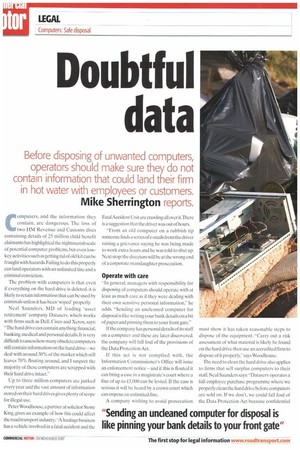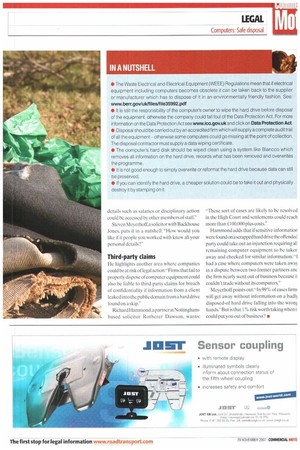Doubtfu 1
Page 44

Page 45

If you've noticed an error in this article please click here to report it so we can fix it.
data
Before disposing of unwanted computers, operators should make sure they do not contain information that could land their firm in hot water with employees or customers.
Mike Sherrington reports.
Computers, and the information they contain, are dangerous. The loss of two HM Revenue and Customs discs containing details of 25 million child benefit claimants has highlighted the nightmarish scale of potential computer problems, hut even lowkey activities such as getting rid of old kit can be fraught with hazards. Failing to do this properly can land operators with an unlimited fine and a criminal conviction.
The problem with computers is that even if everything on the hard drive is deleted, it is likely to retain information that can be used by criminals unless it has been 'wiped' properly.
Neal Saunders, MD of leading 'asset retirement company Dataserv, which works with firms such as Dell, Cisco and Xerox, says: "The hard drive can contain anything: financial, banking, medical and personal details. It is very difficult to assess how many obsolete computers still contain information on the hard drive — we deal with around 30% of the market which still leaves 70% floating around, and I suspect the majority of these computers are scrapped with their hard drive intact."
Up to three million computers are junked every year and the vast amount of information stored on their hard drives gives plenty of scope for illegal use.
Peter Woodhouse, a partner at solicitor Stone King, gives an example of how this could affect the road transport industry: "A haulage business has a vehicle involved in a fatal accident and the Fatal Accident Unit are crawling all over it.There is a suggestion that the driver was out of hours.
"From an old computer on a rubbish tip someone finds a series of e-mails from the driver raising a grievance saying he was being made to work extra hours and he was told to shut up. Next stop:the directors will he at the wrong end of a corporate manslaughter prosecution.
Operate with care In general. managers with responsibility for disposing of computers should operate with at least as much care as if they were dealing with their own sensitive personal information," he adds. "Sending an uncleaned computer for disposal is like writing your bank details on a bit of paper and pinning them to your front gate." If the company has personal details of its staff on a computer and these are later discovered, the company will fall foul of the provisions of the Data Protection Act.
If this act is not complied with, the Information Commissioner's Office will issue an enforcement notice — and if this is flouted it can bring a case in a magistrate's court where a fine of up to £5,(X)0 can be levied. If the case is serious it will be heard by a crown court which can impose an unlimited tine.
A company wishing to avoid prosecution must show it has taken reasonable steps to dispose of the equipment. "Carry out a risk assessment of what material is likely be found on the hard drive then use an accredited firm to dispose of it properly," says Woodhouse.
The need to clean the hard drive also applies to firms that sell surplus computers to their staff Neal Saunders says:"Dataserv operates a full employee purchase programme where we properly clean the hard drive before computers are sold on. If we don't, we could fall foul of the Data Protection Act because confidential details such as salaries or disciplinary action could be accessed by other members of staff."
Steven Meyerhoff.a solicitor with Backhouse Jones, puts it in a nutshell: "How would you like if it people you worked with knew all your personal details?"
Third-party claims He highlights another area where companies could be at risk of legal action:-Firms that fail to properly dispose of computer equipment could also be liahle to third-party claims for breach of confidentiality if information from a client leaked into the public domain from a hard drive found on a skip."
Richard Hammond,a partner at Nottinghambased solicitor Rotherer Dawson, warns: -These sort of cases are likely to be resolved in the High Court and settlements could reach more than £100,000 plus costs."
Hammond adds that if sensitive information were found on a scrapped hard drive the offended party could take out an injunction requiring all remaining computer equipment to be taker away and checked for similar information:"] had a case where computers were taken away in a dispute between two former partners anc the firm nearly went out of business because ii couldn't trade without its computers."
Meyerhoff points out:" in 99% of cases firrft will get away without information on a badly disposed-of hard drive falling into the wrorq hands." But is that I% risk worth taking when could put you out of business? •






















































































































































































